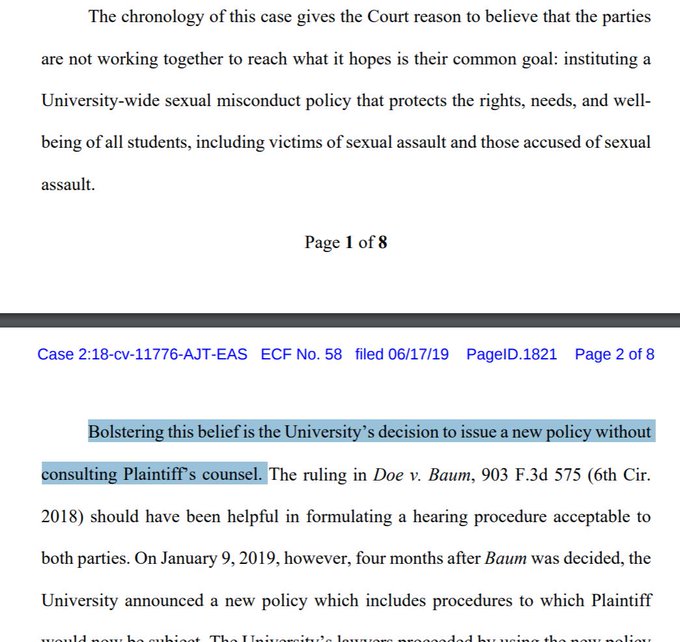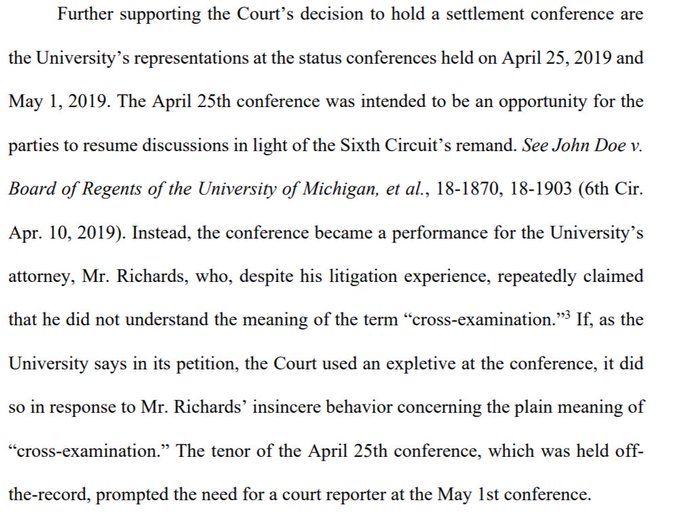The University of Michigan does not have a good history with Senior U.S. District Judge Arthur Tarnow.
That history got even worse on Monday.
The federal judge let loose a stream of invective against the university in an eight-page brief to the 6th U.S. Circuit Court of Appeals, citing its behavior in a due-process lawsuit by a student accused of sexual misconduct.
Tarnow accused UMich and its “ever-expanding” legal team – three law firms and its general counsel – of caring more about President Mark Schlissel’s image than “providing a fair process for adjudicating sexual misconduct claims.”
The university has been arguing with Tarnow for more than a month about his demand that Schlissel (feature image) appear at a settlement conference in the case. A transcript of a May 1 conference shows UMich lawyer Joshua Richards repeatedly relitigating the order, questioning Tarnow’s intelligence, and then asking the judge to dismiss himself from the case.
The 6th Circuit approved the university’s motion to stay Tarnow’s hearing last week, where Schlissel had been ordered to appear, and asked him for an explanation. Tarnow’s Monday brief blamed the university for bad-faith stalling tactics and needless publicity.
He also questioned the intelligence of Richards, the university’s lawyer, who “repeatedly claimed that he did not understand the meaning of the term ‘cross-examination’” at an April 25 teleconference.
“The Court hopes to hold this informal conference in open court” – a point of contention with UMich – “to quell the public’s confusion concerning the status of the case which has been generated by the University’s recent filings,” Tarnow told the 6th Circuit.
The Bill Clinton-appointed judge has twice ruled against UMich in the past year for withholding due process from parties accused of sexual misconduct, in this case and another brought by a female professor.
‘Delay, uncertainty, and additional billable hours’ for no reason
UMich has repeatedly insisted that Schlissel has better things to do than appear in Tarnow’s court, and that the president does not have “primary responsibility” for the Title IX policy.
It could not tell Tarnow which official actually has that authority, however, and the judge demanded Schlissel appear as the only person who can approve a final settlement proposal. Resolving this case “should be more important to [Schlissel] than almost anything going on at the university,” he said May 1.
In his Monday brief, Tarnow (left) defended his prerogative over “case management” and his belief that the parties were “not working together” to institute a sexual misconduct policy that can pass legal muster.
He laid the blame squarely on the university, which failed to consult the accused student’s attorney before issuing a new sexual misconduct policy.
MORE: Stop arguing and turn over Schlissel, Tarnow says
The 6th Circuit’s Baum ruling last fall, which ordered universities to let an “agent” of the accused student cross-examine the accuser in a live hearing, “should have been helpful in formulating a hearing procedure acceptable to both parties” in this case, Tarnow wrote.
The revised UMich policy followed four months later, and its lawyers cited it “as a basis for declaring compliance with due process and for filing a motion to dismiss” the lawsuit:
The University’s unilateral actions virtually guarantee the possibility of an appeal of any ruling by the Court. The result? Delay, uncertainty, and additional billable hours for an ever-expanding defense team, with no added value to its client. … [UMich should have]—at a minimum—sought input from Plaintiff’s counsel before instituting a
policy which directly affects her client and the outcome of this case.
Tarnow showed his irritation in footnotes. One identifies the three firms on retainer for UMich in this case and says its general counsel is “probably on a salary” yet didn’t make an appearance in the year-old suit until early June.
He also distinguished the behavior of the university’s many lawyers, who seek “a fair result to be achieved expeditiously,” from the university itself, though he singled out Richards for contempt.
 The 6th Circuit had just remanded the case to Tarnow’s court when the parties met for a settlement conference, but Richards (right) used the occasion to make a “performance,” the judge said. This is where Richards confessed his confusion at the meaning of “cross-examination,” and apparently it caused Tarnow to swear at him.
The 6th Circuit had just remanded the case to Tarnow’s court when the parties met for a settlement conference, but Richards (right) used the occasion to make a “performance,” the judge said. This is where Richards confessed his confusion at the meaning of “cross-examination,” and apparently it caused Tarnow to swear at him.
The judge did not deny UMich’s accusation of the “expletive,” but said if he did swear, it was because of the “insincere behavior” of Richards. The reason the May 1 conference had a transcript was because of the “tenor” of the April 25 “off-the-record” meeting, he told the appeals court.
MORE: UMich withholds degree, transcript with no hearing
Tarnow laid out his argument again for Schlissel’s appearance in court, including the president’s “ultimate authority” to resolve the case and UMich’s failure to even provide the title of another official with “full settlement authority.”
Schlissel has already violated the rules of Tarnow’s court by refusing to appear as the “client” in the lawsuit at the initial status conference, the judge said:
His attendance at the conference avoids the need to resort to the bureaucratic and lengthy settlement process inherent in university litigation. It is also important for the President to be aware of the demeanor of his legal representative.
He mocked the university’s argument that Tarnow plans to “cross-examine” Schlissel. He doesn’t have to say anything, the judge said: “As with any settlement conference, the talking will be left to the attorneys.”
Conference should be public because of university’s bumbling
The university’s stated desire to protect the settlement talks from becoming a media circus is belied by its own actions, according to Tarnow.
The settlement conference with Schlissel was Tarnow’s attempt to protect everyone from “unnecessary publicity and delay,” yet “the University’s attorneys have refused to participate in good faith,” the judge wrote.
Richards’ refusal to provide the president unless Tarnow put it in a written order has resulted in publicity that “neither helped the University’s image nor contributed to the resolution of this case,” according to the judge. He noted a local legal publication ran an “ambiguous headline” that suggested Schlissel himself was wanted for sexual misconduct.
UMich attorneys look “more concerned with keeping the President out of the public eye” than designing a fairer sexual misconduct process, he said. Tarnow has “bent over backwards” to accommodate Schlissel’s schedule, to no avail.
MORE: UMich’s terrible, horrible, no good, very bad day at the 6th Circuit
It’s true that Tarnow made a “last-minute decision” to hold the settlement conference in public, as opposed to the in-chambers private meeting he had previously suggested.
But the judge said the change was prompted by his desire for transparency and the university’s June 5 motion to dismiss, which “incited confusion amongst the media on whether it was an attempt by the University to avoid the conference.”
The university has “pursued every possible avenue for garnering publicity in this case,” including by using an “improper method” to get the 6th Circuit to intervene, Tarnow wrote. It wasted a month by seeking a “writ of mandamus,” giving the appeals court one day to consider the filing, rather than seeking “interlocutory appeal” of Tarnow’s May 8 order denying reconsideration.
UMich told the Detroit Free Press that Tarnow’s brief showed why the public university “is deeply concerned by the fairness of the proceeding in this case.”
Spokesperson Kim Broekhuizen cited Tarnow’s change of mind on the openness of the settlement conference “less than 48 hours before” as the reason for Schlissel’s backing out. He was “fully prepared” to attend a closed conference, she said, and Tarnow has not explained how an open conference would lead to a faster resolution “than a private discussion between the parties and the court.”
MORE: UMich violated professor’s right to cross-examine accusers






